Drag Night Namibia: “What we are doing here today is massive”

Amid momentous legal victories and disappointing let-downs, Namibia’s queer community and activists celebrate a radical joy.
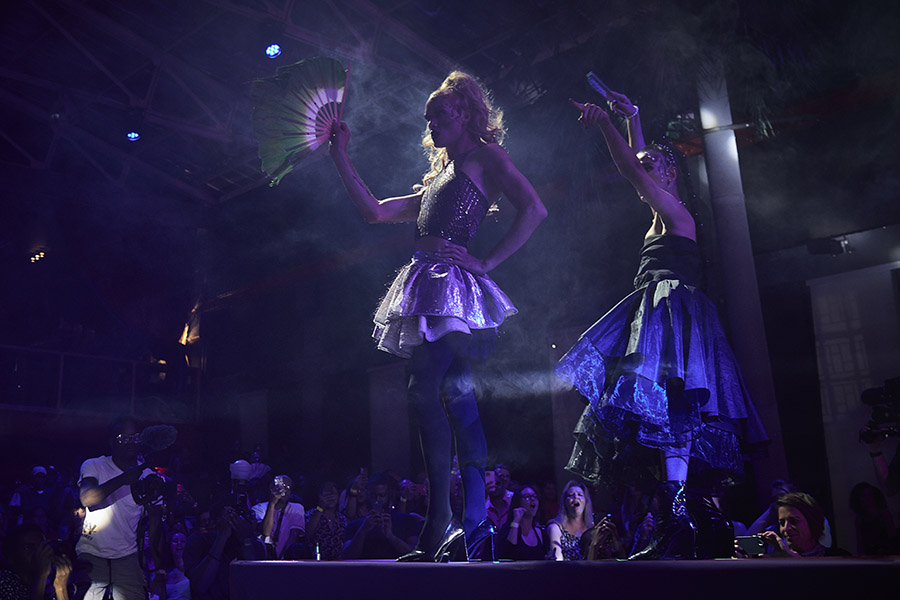
Gigi Has Arrived from The House of Arrivals and Miss Mavis from The House of Dash take the stage at Drag Night Namibia. “When you experience it, you feel on top of the world, like whatever you think creatively, can be a reality. And the most beautiful thing is there are people that are celebrating it with you,” says Rodelio Lewis, AKA Miss Mavis. Credit: Chris de Beer-Procter.
It’s Drag Night in Namibia and The Loft for You, a venue in the southern industrial area of Windhoek, is filled with elated revellers. The diverse crowd, which ranges broadly over age, race, sexual and gender expression, filters through the doors eagerly. Once they pass the various, intersectional “pride” and civil rights groups’ flags, they are delighted by a cast of charismatic performers. Between the sultry, shimmying performances, rife with queer joy, activist Omar van Reenen takes the stage.
“What we are doing here today is massive,” they say. Behind them hangs a rainbow flag bearing the word “Peace”. The venue is near capacity. The crowd, the largest to attend the episodic drag show since its inception in 2020, is electric. “Taking up space in a born-free Namibia,” van Reenen continues. “This is what our liberators fought for. Because their blood waters our freedom, too!” The crowd erupts into cheering applause.
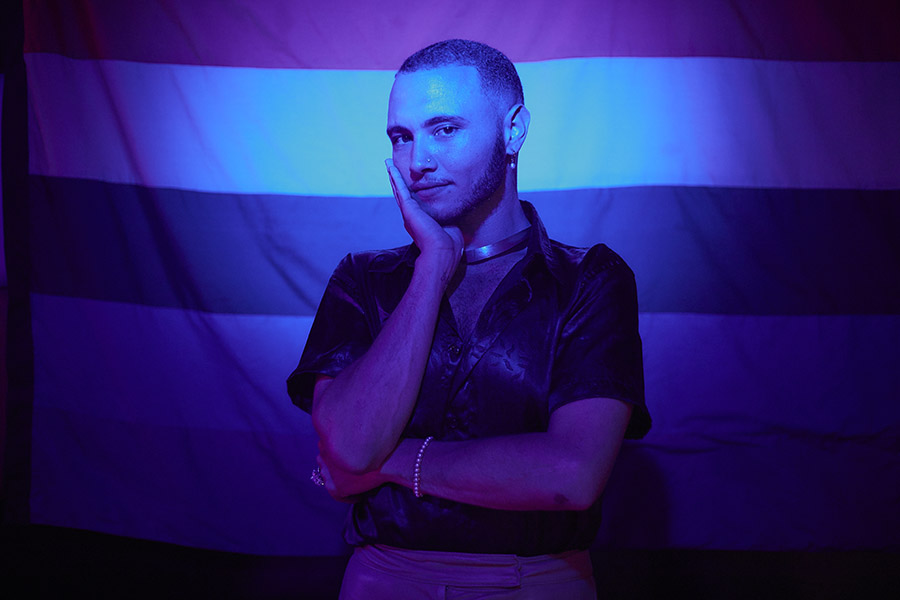
Omar van Reenen, founder of Equal Namibia stands before a pride flag tinted by venue lights at the entrance of Drag Night Namibia’s second anniversary event.
Anyone familiar with drag scenes from almost anywhere in the world would find van Reenen’s words completely at home in the space. That’s because throughout its history, drag artistry has been tied to subversive, queer politics that challenge heteropatriarchal power systems and advocates for LGBTQ equality through the radical and often joyful subversion of gender norms. Throughout history, the drag club has been a natural home for activism.
“In its essence, drag is a political statement,” says Rodelio Lewis, the founder and CEO of Drag Night Namibia who also hosts the events as his drag persona Miss Mavis Dash. “It’s very satirical at times, but also at the same time most of our performers take this so seriously. It is a political statement every single time they step on stage or step out in drag.”
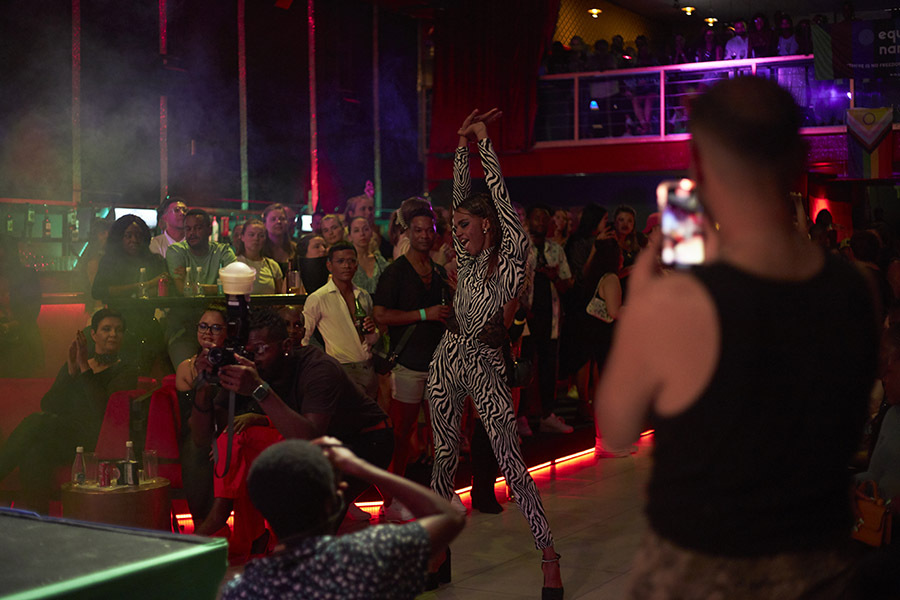
Miss Shy Dash works the crowd at Drag Night Namibia.
This is especially true now in Namibia, where the LGBTQ community’s fight for civil rights has ramped up significantly over the last few years. For a country with such a small population of just 2.5 million, the number of legal challenges to state-sanctioned homophobia has been astounding. In fact, this evening’s event falls neatly between two Supreme Court hearings related to LGBTQ civil rights that have been years in the making. The day before, 3 March, the court heard a challenge to the state’s refusal to recognise same-sex marriages convened in other countries, thus disqualifying families with foreign-born spouses of queer Namibians from claiming domicile to live and work. Two days later, a case regarding parental rights of same-sex families, one which in no small part sparked a significant portion of the country’s new queer movement, will be heard in the Supreme Court too. The outcome of these cases will have monumental implications for queer Namibians and their families for generations to come.
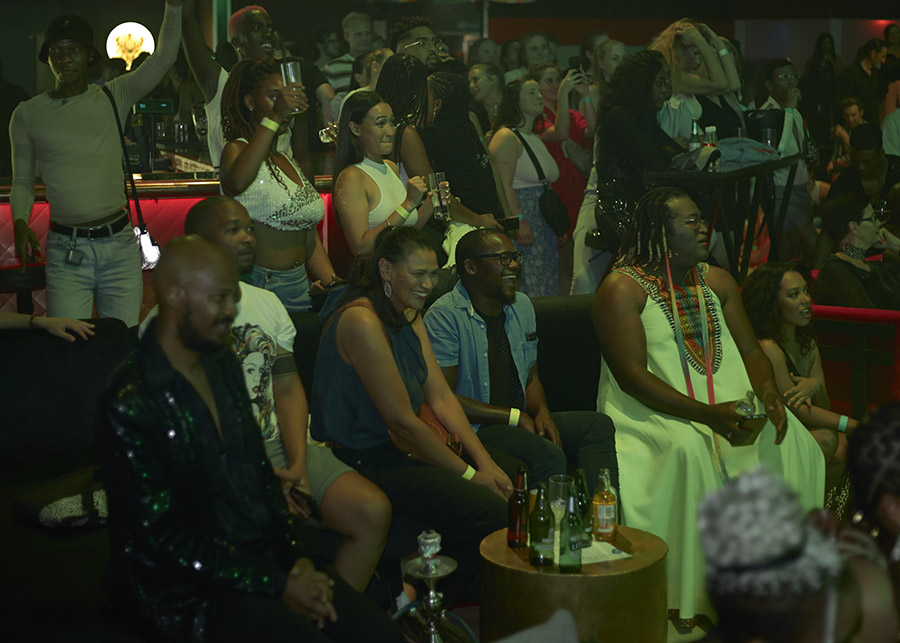
Activists and allies at the Positive Vibes Trust organisation’s table enjoy the show. Daniel Digashu, a litigant in the same-sex marriage recognition case sits in the middle (blue collared shirt). “Drag night is such a breath of fresh air…To see gay people happy, in one place as a collective. The amount of joy, with all the painful stuff that’s going on in the fight, it’s good to be in a safe space with the group of LGBT people,” Daniel reflects.
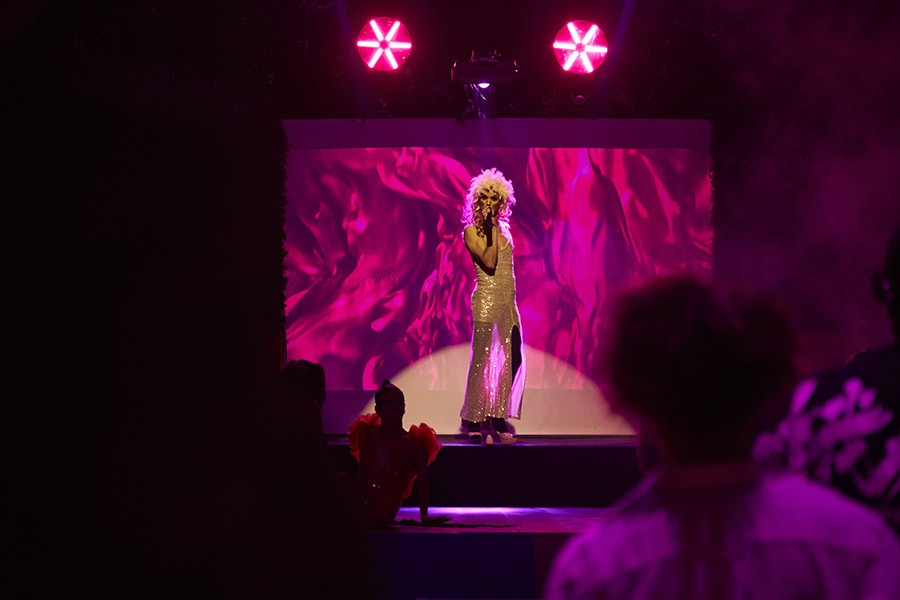
Gigi has Arrived from The House of Arrivals performs at Drag Night Namibia.
The country’s small but dedicated civil rights movement, which is largely spearheaded by youth, has not only rallied around these legal challenges but also around spaces like Drag Night that cater to other sides of the queer experience – that of joy, community, and celebration. As Rodelio reflects, “It’s one part of the puzzle of this fantastic collaborative effort from queer and allied organisations in the movement for equality and inclusivity.”
For many who attend, especially those engaged in activism, it’s a meaningful experience. “With all the painful stuff that’s going on in the fight, it’s good to be in a safe space with our people,” says Daniel Digashu, a litigant in the marriage recognition case. “I broke down a few times, because it’s so special,” he continues. “I feel like we deserve that, that bit of happiness.”
Centuries into its legacy, drag still provides a vessel for LGBTQ folk to gather, to experiment with and express their gender all the while mobilising for the ever present need to fight for our civil rights.

The crowd enjoys a performance. “Queer spaces were so devoid in Namibia when I was growing up. To see it changed and so visible, to have a thriving and bustling queer community where you can find and identify yourself…man what a joy. What a thrill,” reflects Sven-Eric who performed at Drag Night Namibia.

Selena Dash from The House of Dash interacts with an audience member. “It’s something very beautiful for people to experience someone in their most vulnerable and true self and visa versa for someone to showcase that and receive such love and respect, it’s a very community building experience and it’s very beautiful,” says Rodelio Lewis.
On 6 March 2023, the Supreme Court heard a case on the parental rights and citizenship of a son of a same-sex couple. It overturned a previous High Court ruling that had granted citizenship by descent, marking a disappointing loss for the queer rights movement. The couple has been ordered to register the child as Namibian at the country’s Home Affairs. His citizenship is currently in limbo.
On 16 May 2023, the Namibian Supreme Court handed down a verdict on another case. This time it ruled in favour of same-sex couples seeking recognition for their marriages where one spouse is foreign-born and the marriage was conducted in another country. This verdict was a significant win for LGBTQ rights in Namibia.

Miss Mavis Dash acknowledges Deyoncé Cleopatra Chaniqua Naris (or ‘Mamma D’ as she’s affectionately known), a trans woman and executive director of the Transgender, Intersex and Androgynous Movement of Namibia (TIAMON) and the chairperson of the Southern African Trans Forum, Windhoek, Namibia. ““Under the joy and the dancing, when you give someone a hug you just wonder what it is that they’re going through,” says Daniel Digashu.
All photographs by Chris de Beer-Procter.



